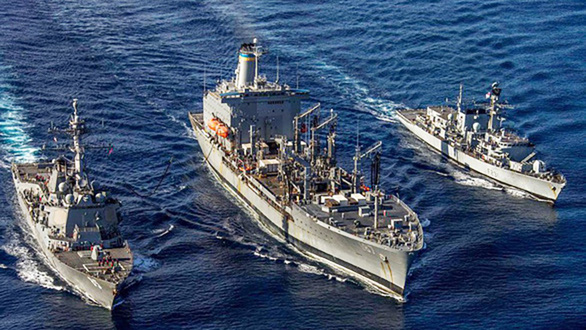The biggest danger of China’s illegal moves in the East Vietnam Sea is not Chinese militarization of its artificial islands, which it has already done, but its ability to get states to accept its interpretation of international law, Prof. Zachary Abuza told Tuoi Tre News.
The Chinese survey ship Haiyang Dizhi 8 and its escorts have, since July 3, blatantly disrupted and interfered with Vietnam’s economic activities through illegal moves in the waters inside Vietnam’s Exclusive Economic Zone (EEZ) and Continental Shelf near the Tu Chinh – Vung May (Vanguard Bank – Rifleman Bank) region in the East Vietnam Sea.
In the latest move, Vietnam on Thursday called for immediate withdrawal of Chinese ships from the East Vietnam Sea.
Speaking at a press conference in Hanoi, Vietnam’s foreign ministry spokesperson Le Thi Thu Hang labeled China’s recent activities in the East Vietnam Sea “serious," underlining that Vietnam had sent diplomatic notes to China, demanding “immediate withdrawal” of the ships.
Such reactions from Vietnam are essential, considering the fact that experts have been warning about China’s tactics to silently seek domination on the sea.
According to Prof. Zach Abuza from the U.S. National War College, China is making use of its economic and military muscle to assert its claims to the sea.
In this article written exclusively for Tuoi Tre News, the Southeast Asia politics and security expert argued that the most important thing for small countries to do now is stop China’s intention to write the rules.
China’s hypocritical position
The Chinese survey ship Haiyang Dizhi 8 has spent the past several weeks conducting seismic research in Vietnam’s waters. This is a clear violation of international law.
Under the UN Convention on the Law of the Sea (UNCLOS), which China is party to, Vietnam is entitled to a 200-nautical-mile EEZ, as well as continental shelf rights.
China’s research and any exploratory drilling, such as the HYSY 981 in 2014, is a clear violation of Vietnamese sovereignty.
China’s position on the Law of the Sea is both hypocritical and inconsistent. That is an intentional tactic to give it maximum maneuverability.
While it asserts that it is committed to international law, its unilateral declaration of the so-called 'nine-dash line' has no basis in international law.
Moreover, while it asserts that Vietnam has no continental shelf rights or EEZ, this remain the basis of China’s claims in its own maritime dispute with Japan in the East China Sea.
The Permanent Court of Arbitration’s (PCA) 2016 ruling on a suit brought by the Philippine government provided the most authoritative ruling on UNCLOS. Their ruling negated any legal basis to China’s so-called 'nine-dash line.'
The PCA also ruled that while China can assert “historical use” of the waters, proving historical use does not disprove historical use by other claimants.
Multilateral assertion from ASEAN
Nonetheless, the PCA ruling has altered Chinese behavior in small ways. While China has not abandoned its 'nine-dash line,' it continues to assert territorial rights from its six man-made islands.
It asserts both territorial rights as well as EEZs from each of its man-made islands, though UNCLOS is clear: artificial islands do not receive any entitlements.
Second, it has stated its intention to claim straight baselines around [Vietnam’s Truong Sa (Spratly) Islands], something that it has already done with [Vietnam’s Hoang Sa (Paracel) Islands].
China continues to assert its sovereignty by using its coast guard and maritime militia to deny access to the disputed waters to fishermen from other claimant states, including by force.
Finally, China has continued to use its vast economic power to constantly dangle a Code of Conduct in front of the Association of Southeast Asian Nations (ASEAN).
But its draft provisions completely disadvantage the other claimant states’ ability to exploit their natural resources without approval or joint development with a Chinese partner. Beijing’s draft should be rejected.
Nothing would help challenge China’s unilateral interpretation of international law more than a multilateral assertion from ASEAN, in concert with its partners.
The biggest danger is not Chinese militarization of its artificial islands, which it has already done, but its ability to get states to accept its interpretation of international law.
The United States engages in Freedom of Navigation Operations (FONOPS), which are intentionally designed to challenge a specific aspect of Chinese (or any other country’s) excessive maritime claims. France and the United Kingdom have commenced their own, but others must as well.
China just tested anti-ship missiles in the East Vietnam Sea, indicating both its capabilities as well as a sufficient quantity of them.
While China is unlikely to escalate a military conflict with the United States at this time, it is cognizant that those FONOPs serve to challenge China’s excessive claims. FONOPS are not just a military threat, but a legal threat.
If international law is to mean anything, then states must come to its defense and work to uphold it. If they don’t then China not only controls the territory, but writes the law.



















































